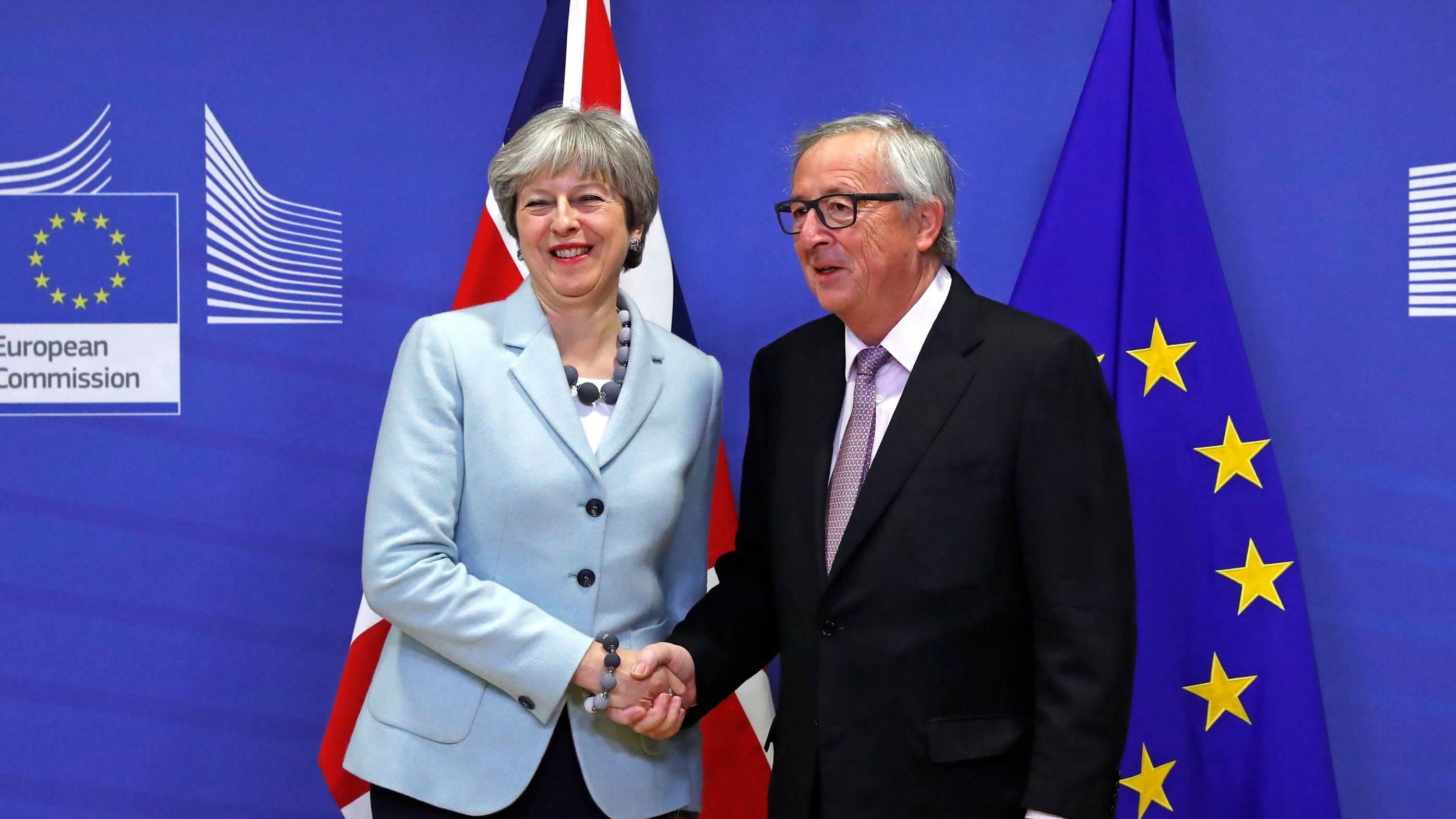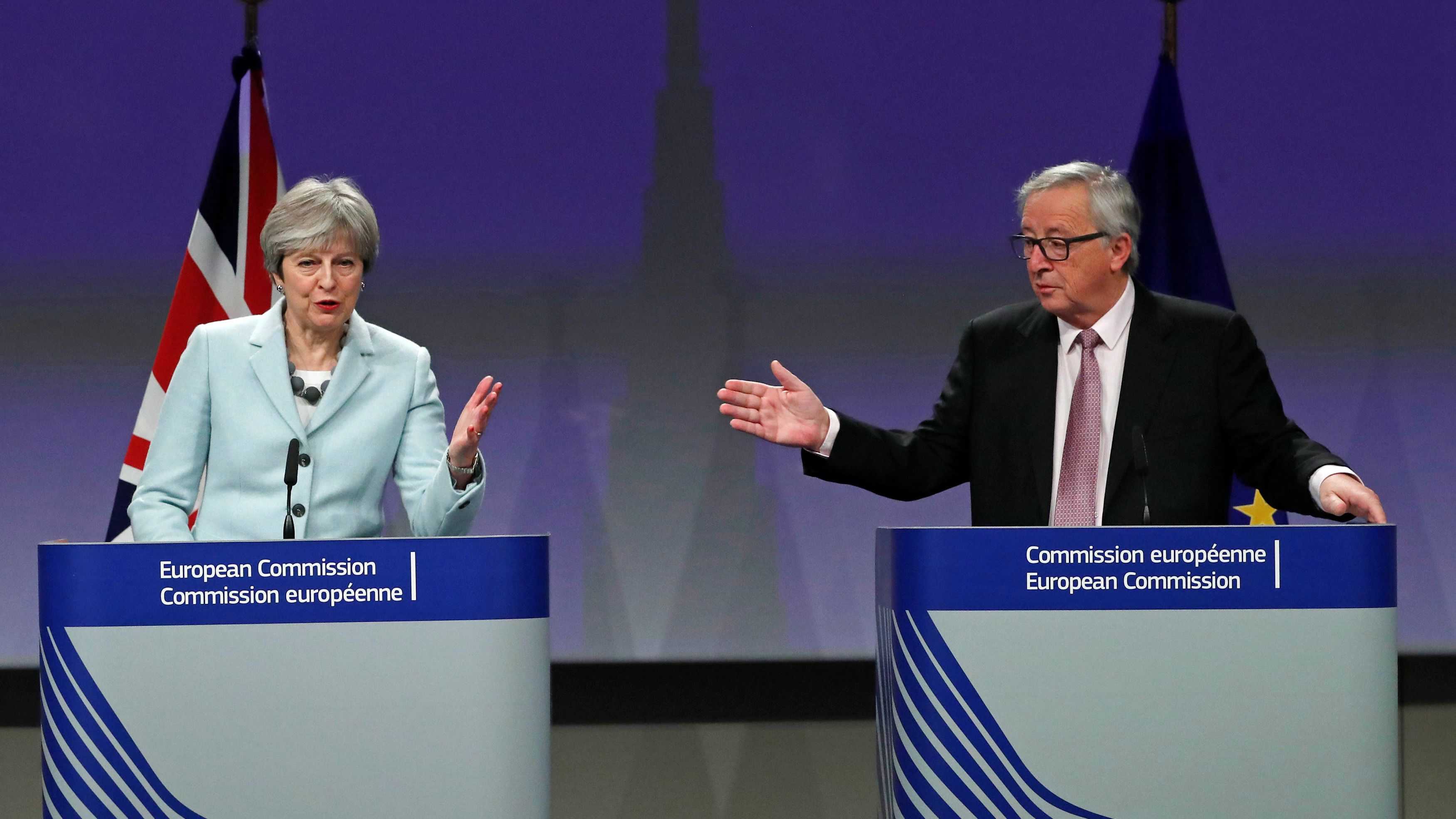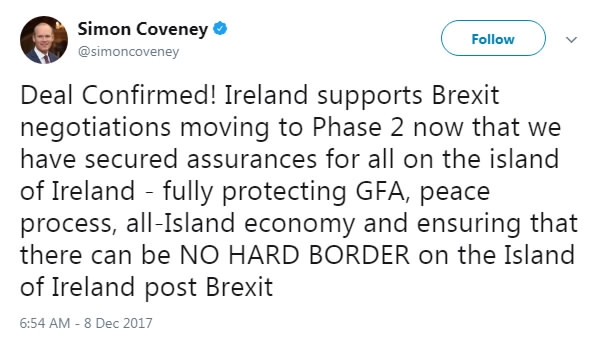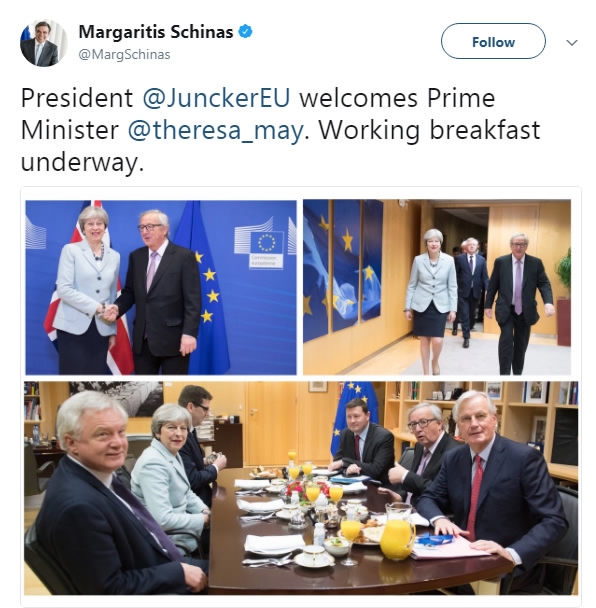
Politics
15:14, 08-Dec-2017
Brexit 'breakthrough' as deal agreed with no Irish hard border
By John Goodrich

A deal has been struck on the terms of Britain’s divorce from the European Union, days after talks collapsed over disagreements about how to run the post-Brexit Irish border.
The new agreement includes a committment to no hard border between Northern Ireland and the Republic of Ireland, and means negotiations can soon turn to phase two: The UK's future relationship with the EU.
British Prime Minister Theresa May traveled to Brussels early on Friday morning for a crunch meeting with European Commission President Jean-Claude Juncker, arriving at the European Commission headquarters before 7:00 a.m. after a night of discussions.

Britain's Prime Minister Theresa May and European Commission President
Jean-Claude Juncker hold a news conference at the EC headquarters in Brussels,
Belgium on December 8, 2017. /Reuters Photo
Britain's Prime Minister Theresa May and European Commission President Jean-Claude Juncker hold a news conference at the EC headquarters in Brussels, Belgium on December 8, 2017. /Reuters Photo
Juncker announced in a press conference that “we have now made the breakthrough we needed” and that the European Commission would recommend that “sufficient progress” had been made to proceed to the second phase of negotiations on trade ties.
The agreement must still be ratified by leaders from 27 EU countries at an EU Council meeting on December 14-15, but Juncker said he was “confident that they will share our appraisal.”
The agreement included proposed solutions to three key issues: A financial settlement, EU citizens’ rights in the UK, and the Irish border.
Sticking points unstuck
Britain has been desperate to move talks on to its future relationship with the EU – and crucially trade ties. The three issues holding up the second phase of talks now appear to have been resolved.
Irish border
Brexit will mean a 499-kilometer hard border between the UK and the EU, in the shape of the Irish border. How it will operate in terms of trade, movement and security is intensely sensitive and could have grave political consequences. May said a deal had been agreed to have no hard border, and that agreement would also mean the whole of the UK leaving the single market.
The British prime minister added that the compromise on the Irish border would ensure that the Good Friday agreement – central to the peace process – is upheld.

Twitter Screenshot
Twitter Screenshot
Irish Foreign Minister Simon Coveney tweeted that no hard border had been guaranteed, and added that Ireland would back the move to phase two of negotiations.
However, the DUP -- the small Northern Irish party May depends on for votes in parliament -- said there were still issues to be discussed, even as negotiations move forward.
The EU Commission said "the United Kingdom acknowledges the unique situation on the island of Ireland and has made significant commitments to avoid a hard border."
Scottish First Minister said any special deal for Northern Ireland must be available to all parts of the UK, a potential future headache for May.
Financial settlement
Britain must agree on a so-called “divorce bill” to pay its financial commitments to the EU.
The EU Commission said in a statement: “As regards the financial settlement, the United Kingdom has agreed that commitments taken by the EU28 will be honoured by the EU28, including the United Kingdom.”
Citizens’ rights
Almost three million people from other EU countries currently live in the UK, while more than one million Britons reside elsewhere in the bloc.
The EU Commission said under the agreement "the rights of EU citizens living in the United Kingdom and United Kingdom citizens in the EU27 will remain the same after the United Kingdom has left the EU. The Commission has also made sure that any administrative procedures will be cheap and simple for EU citizens in the United Kingdom.”
What's next?
EU leaders will meet on December 14-15 to decide if “sufficient progress” has been made on the three main issues to proceed to phase two of the negotiations, but this seems to be almost guaranteed after Ireland voiced its support.

European Commission spokesperson Margaritis Schinas tweeted about Friday's early morning meeting. /Twitter Screenshot
European Commission spokesperson Margaritis Schinas tweeted about Friday's early morning meeting. /Twitter Screenshot
President of the European Council Donald Tusk has already sent draft Brexit trade talks guidelines to EU leaders -- a key component of phase two negotiations.
On Friday morning Tusk said much had been achieved but the most difficult talks lay ahead. He added that the first issue to be discussed in phase two would be a transition period after Britain leaves the bloc, a period in which he said the UK must respect all EU law.
Tusk said that he was preparing for a close partnership on trade, security, defense, and foreign policy.
7971km

SITEMAP
Copyright © 2018 CGTN. Beijing ICP prepared NO.16065310-3
Copyright © 2018 CGTN. Beijing ICP prepared NO.16065310-3